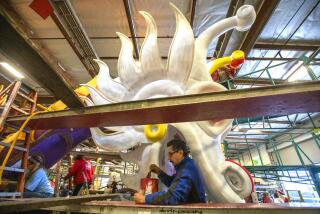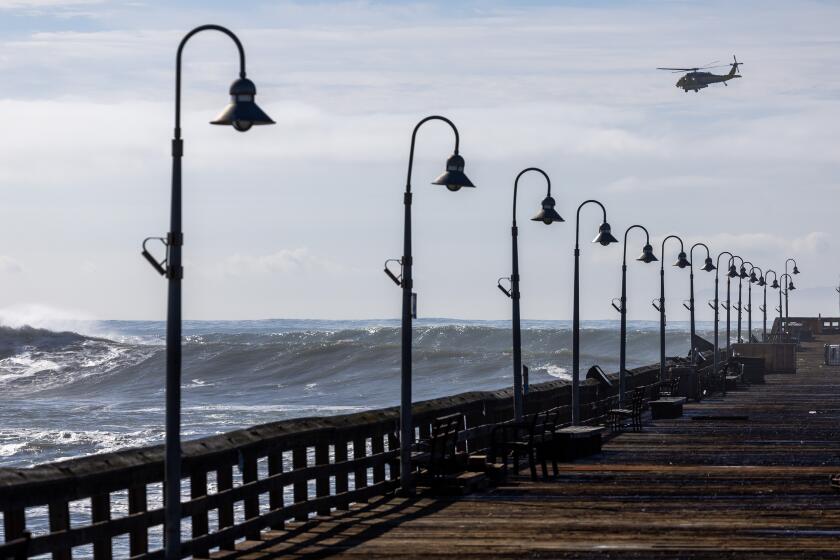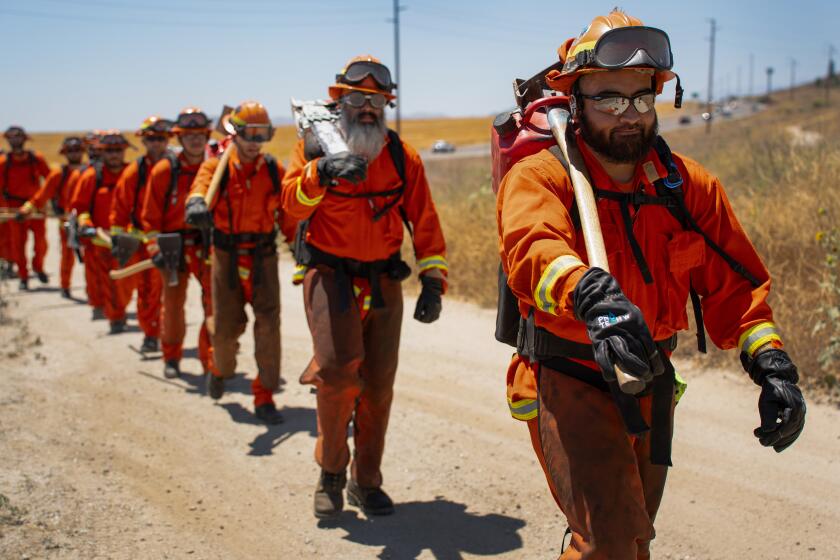‘Auntie’s’ Pride and Joy : ‘Loving librarian’ Helen Brown, 80, shares her passion for her Filipino heritage with the public through her library. : HEARTS of the CITY / Exploring attitudes and issues behind the news
A phone call to “Auntie Helen’s” library was all it took a San Diego singer to get the words to an old Filipino ballad, sung by farmers planting rice.
Four visits to the library helped a UCLA graduate student complete his research on the Filipino American community of the 1920s and 1930s.
Welcome to “Auntie Helen’s” Pilipino American Reading Room and Library--an emporium of more than 5,000 books, periodicals, maps, artifacts, musical instruments, tribal weapons, games, dolls, kitchen utensils and much more.
“We’re a multimedia library,” said Helen Brown, 80, the founder and librarian. She is especially proud of her extensive newspaper clipping files and photo albums.
No request is considered too small or too big, and Brown treats all who come like a long-lost relative.
“What you get is the full attention of a loving librarian who is knowledgeable and always willing to help,” said Nonoy Alsaybar, a PhD candidate in anthropology at UCLA and a regular visitor to the library. “We are so blessed to have Auntie Helen.”
The Pilipino American Reading Room--better known by its acronym PARRAL--is the mission of the former schoolteacher, known affectionately as Auntie Helen. (“Filipino” is spelled with a P to adhere to the Tagalog language, which has no F sound. In some Filipino American circles, to use the “P” is an expression of Filipino pride.)
Brown, who was born in Manila of an Anglo father and Filipino mother, hopes PARRAL can be a way to enlighten and unite Filipinos of all backgrounds.
“We should have pride in our common identity . . . so we can then contribute to the [larger] society,” she said.
Helen Brown’s own cross-cultural journey began 62 years ago, after moving here from Manila when she was 17 years old.
At Pasadena City College, Helen Agcaoili Summers chose to do a report on the Spanish influence on Manila. Finding nothing on the subject in her school or county libraries, she combed her father’s scrapbooks and memorabilia to complete the assignment.
The experience propelled her to become a lifelong collector.
In 1974, when Brown retired from the Los Angeles Unified School District, she organized what she had been amassing for four decades into a home library. As demand for “Helen’s library” grew, she searched for a way to make it more accessible.
Her wish was granted in 1985 when the Filipino Christian Church near downtown donated space in the basement.
Two years ago, with a $7,000 endowment from her family, she moved the library to its current, well-lighted Luzon Plaza quarters at 1925 W. Temple St., in the heart of what passes for Los Angeles’ Filipino Town.
The opening was a milestone in the history of the local Filipino community, one of the largest outside Manila. Filipinos account for one in four Asians in the city. They outnumber Chinese as the largest Asian group not only in Southern California, but also the rest of the state.
The library is open four afternoons a week, and an answering machine is on the rest of the time to handle urgent requests. .
“The library is a sanctuary,” said Eleanor Academia-Magda.
When she needed information on the ancient Filipino gong-drum called kulintang, she called Brown and said: “I want everything you can find on Filipino music.”
“Whew! You’re asking a lot,” Brown replied. “Why don’t you come on over.”
Academia-Magda found more than she could use to write a proposal that eventually enabled her to open the nation’s only kulintang research center in Reseda.
*
Brown identifies with Filipino students, unschooled in their culture but eager to learn.
By way of explanation, she tells them that the Philippines was the only Asian country colonized by Western powers--Spain and the United States. During the four centuries of Western domination, Filipinos came to believe Western culture was superior to theirs.
Brown, too, lived through a period of denial. When she was attending UCLA, she told people she was from Hawaii, to better fit in and to avoid being asked about the Philippines.
After graduating in 1937, she became a teacher, married and raised four sons. It wasn’t until the 1960s, with the huge influx of Filipinos to Los Angeles, that she rediscovered her identity and became a “born-again” Filipino.
As Brown observed immigrant children struggling in their new surroundings, she remembered her own search for identity.
“They would never speak out in the classroom,” she said. Teachers unfamiliar with Filipino behavior dismissed them as stupid, and the youngsters felt that something was wrong with them, Brown said. “In this culture you have to talk” to be recognized.
With the zeal of a convert, Brown lobbied the school district to recognize the special needs of the Filipino children and brought together resource materials to educate teachers.
Marshaling resources, she helped organize Filipino American community groups and worked with other Asian American organizations.
More than two decades later, Helen Brown hopes, God willing, to live 20 more years, to see her library blossom into an important learning center not only for Filipinos, but also anyone interested in one of the world’s most diverse people.
“My dream and prayer is that we will have our own building and our own paid staff someday,” she said. “I pray for that every night when I say my prayers.”
(BEGIN TEXT OF INFOBOX / INFOGRAPHIC)
Today’s centerpiece focuses on a retired Filipino American educator who runs a library to teach Filipino culture and history Downtown.
Anyone interested in assisting the Pilipino American Reading Room and Library can contact: Helen Brown, (213) 484-0818.
More to Read
Start your day right
Sign up for Essential California for news, features and recommendations from the L.A. Times and beyond in your inbox six days a week.
You may occasionally receive promotional content from the Los Angeles Times.






